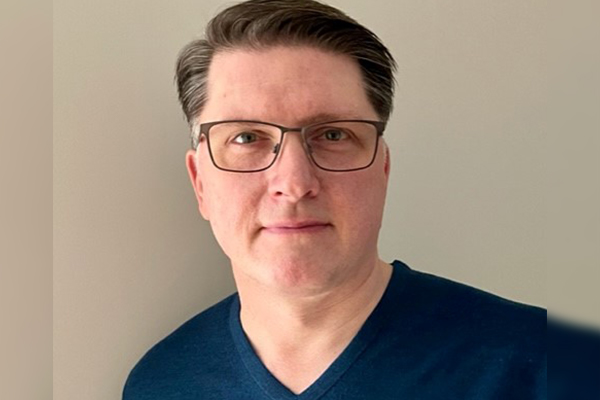Jeremy Baker
DNP, Chicago Heading link

On the day of the Sandy Hook Elementary School shooting in 2012, Jeremy Baker, MS ’19, RN, was working at his job as a lighting designer in a downtown Chicago showroom.
While looking something up for a client on a computer, he saw news of the massacre: 26 people dead, including 20 children. In one image, a girl being led from the school looked to Baker like his then 10-year-old daughter.
“It just leveled me,” he says. “I was devastated. I felt this tremendous need to go and help them and realized I had absolutely no skills to do so.”
Later, he expressed all this to his wife, who works on the administrative side of healthcare. She suggested he consider nursing.
After returning to school to complete his bachelor’s degree, he enrolled in the UIC College of Nursing Master of Science for non-RNs program in his mid-40s. After a clinical rotation on the psychiatry unit at Northwestern Memorial Hospital, he knew he’d found his place.
“We see patients come into the unit at their worst with their mental health, and we help them get to a point where, they’re not fully recovered, but they’re ready for the next phase in care,” he says. “Seeing how big of an effect our care can have on people is what drew me to it.”
Baker, who is now a DNP student in the UIC Nursing Psychiatric-Mental Health Nurse Practitioner program, was recently honored with a Daisy Award for Extraordinary Nurses for his work at Northwestern. His nominator, a bipolar disorder patient, wrote: “Over weeks, Jeremy was by my side, listening to me, validating me, reminding me of all I had and all I could be.”
The patient added: “He helped explain the ward and listened to my fears. Jeremy was consummately professional and compassionate. As my trust in him grew, so did my trust in the system of care—which is what he set out to do. Because of him, I faced my bipolar illness, learned about it and how to manage it.”
Nearly one in five U.S. adults live with mental illness, according to the NIH. Baker says he believes all nurses – even those not working on psychiatric units – play an important role in the mental health of their patients.
“Just like in my case, all nurses see people at their worst – or at least not at their best,” he says. “If a person is in a car accident, or has a sudden medical issue, they’re scared. They’re in a vulnerable position. Nurses are the ones there, making relationships and helping them through it. I think nursing’s role in mental health is enormous. Nurses are the frontlines of mental health care.”